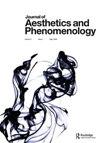Review: Francois Jullien’s Living off Landscape, or the Unthought of in Reason
IF 0.2
0 PHILOSOPHY
引用次数: 0
Abstract
François Jullien’s Living off Landscape, or the Unthought of in Reason, (Vivre de paysage ou L’impensé de la Raison [2014] 2018. trans. Pedro Rodriguez), is another outstanding work in a series of original and challenging studies of Chinese history and culture. A review in a special edition on Landscape East and West is easily justifiable, despite the work not engaging directly with Chinese mountain-and-water-paintings, nor with European landscape painting and its commonly associated concepts such as the beautiful or the sublime, which otherwise stand at the center of Western discourse in art history and aesthetics. The main connection Jullien elaborates regarding landscape is his observation that the general Western concept of “landscape” emerges hand-in-hand with the emergence of landscape painting: “’Landscape’ was first named (thought through) with respect to painting.”(2) Hence, Jullien’s approach is to draw on a similar relation regarding China. Given his overall critical enterprise, he thus explores the resources of Chinese landscape art for a better understanding of what landscape really is all about in that tradition, yet still missing in its Western conception. In short, this book does not directly thematize topics relating to Asian arts and aesthetics instead, the topic of landscape East and West serves as an opportunity for Jullien to evolve his own philosophical project of developing an ecological meditation on the habitable world (in the Greek sense of οἰκουμένη γῆ) in a global perspective. Thus, Chinese landscape painting serves as a prism to deflect and reflect philosophical conceptions.评:弗朗索瓦·朱利安的《以风景为生》,还是《理性中的未思》
弗朗索瓦·于连:《以风景为生,还是理性的未被思考》,《理性的生活》[2014]2018。反式。佩德罗·罗德里格斯(Pedro Rodriguez)),是一系列对中国历史和文化的原创和具有挑战性的研究中的又一部杰出作品。《东西方风景画》特刊中的评论很容易被证明是合理的,尽管这部作品没有直接涉及中国山水画,也没有涉及欧洲山水画及其通常相关的概念,如美或崇高,而这些概念在西方艺术史和美学话语中处于中心地位。于连阐述的关于风景的主要联系是他观察到西方的一般“风景”概念与山水画的出现是密切相关的:“‘风景’最初是与绘画有关的。”(2)因此,于连的方法是在中国借鉴类似的关系。鉴于他的整体批判事业,他因此探索了中国景观艺术的资源,以便更好地理解传统中景观的真正含义,但在西方概念中仍然缺失。简而言之,这本书并没有直接以亚洲艺术和美学为主题,相反,东方和西方景观的主题是朱利安从全球视角发展他自己的哲学项目,发展对可居住世界的生态冥想(在希腊语中为ο ο κο)的机会。因此,中国山水画充当了折射和反映哲学观念的棱镜。
本文章由计算机程序翻译,如有差异,请以英文原文为准。
求助全文
约1分钟内获得全文
求助全文

 求助内容:
求助内容: 应助结果提醒方式:
应助结果提醒方式:


